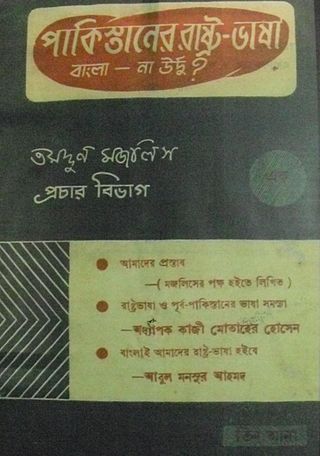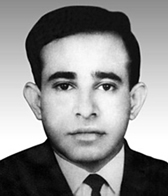
The Bengali language movement was a political movement in former East Bengal in 1952, advocating the recognition of the Bengali language as a co-lingua franca of the then-Dominion of Pakistan to allow its use in government affairs, the continuation of its use as a medium of education, its use in media, currency and stamps, and to maintain its writing in the Bengali script.

Syed Mujtaba Ali was a Bengali writer, journalist, travel enthusiast, academic, scholar and linguist. He lived in Bangladesh, India, Germany, Afghanistan and Egypt.
Shahed Ali was a Bangladeshi litterateur and cultural activist. Aside from being an educationist and his journalism, he was one of the founders of the nationwide Tamaddun Majlish which initiated the Bengali language movement. He edited multiple magazines, was the founding secretary of the Islamic Academy, and is best known for his magnum opus, the short story Jibrailer Dana.

The Tamaddun Majlish, formerly Pakistan Tamaddun Majlish, is an Islamic cultural organization in Bangladesh, established in 1947 by Principal Abul Kashem in the former East Pakistan. It was one of the founding organizations of the Bengali Language Movement.
There were not many political parties at the time of Bengali Language Movement. The Bengali Language Movement was a political movement in former East Bengal advocating the recognition of the Bengali language as an official language. There was Muslim League, who were at the treasury bench. The movement was mainly supported by Awami League, National Congress and East Pakistan Communist Party.

Mohammad Abul Kashem is generally considered as a pioneer and the architect of the historic Language Movement of Bangladesh. He was also a politician, author and an eminent educationist. He founded the Islamic-oriented Bengali cultural organisation Tamaddun Majlish.
The Rashtrabhasha Sangram Parishad was an organisation founded by Bengali politicians and intellectuals to agitate for the recognition of the Bengali language by the Government of Pakistan. It was established on 1 October 1948 by Nurul Bhuiyan. It became one of the most influential groups during the Bengali Language Movement.
The Shorbodolio Kendrio Rashtrobhasha Kormi Porishod was the leading political organisation in the Bengali Language Movement of East Bengal.
Dewan Mohammad Azraf was a Bengali philosopher, teacher, author, politician, journalist and activist. In 1993, he was honoured as a National Professor in Bangladesh. He was also a supporter of the Bengali Language Movement. For his support of the movement, he was dismissed from the post of the principal of Sunamganj College in 1954, the same year he was promoted to the post. His support was particularly influential when he edited the Nao Belal in 1948. He was actively involved with Kaikobad Sahitya Majlish (1972–99).

Pakistaner Rashtra Bhasha: Bangla Na Urdu? is a small book published on 15 September 1947 by Bengali language movement pioneer Principal Abul Kashem on behalf of Tamaddun Majlish. Within one month of Pakistan's Independent by publishing this book, it demanded introduction of Bengali as one of the state language of whole Pakistan. This book also strongly advocated for Bengali as the medium of education, court language and for its use in the offices in East Pakistan.
The Khelafat Majlish, also spelt Khelafat Majlis, is a far-right Islamist political party in Bangladesh. The party was founded in Dhaka, the capital of Bangladesh in 1989 by Deobandi scholar Azizul Haque along with Ahmad Abdul Qadir and former leaders of the National Awami Party and Tamaddun Majlish. Since its founding, it has only ever gained one seat in the country's National Parliament. The party split into two in 2005, with Azizul Haque's faction taking the name Bangladesh Khelafat Majlish.

ʿAzīz al-Ḥaqq ibn Irshād ʿAlī ad-Dākawī, simply known as Azizul Haque or by his epithet Shaykh al-Hadith was a Bangladeshi Islamic scholar, politician, writer, and translator. He is the founder of Khelafat Majlish and first Bangali translator of Sahih al-Bukhari. He was vice chancellor of Jamia Rahmania Arabia Dhaka.

Abdul Gafur Hali was a Bangladeshi folk lyricist, composer and singer of the Maizbhandari musical tradition. He was the first folk play author to use the Chittagonian language. His works are created mainly in his native language of Chittagong. He was also known by his Sufi name, Gafur Hali Maizbhanderi.

Mohammad Abdul Muktadir was a Bengali geologist and academic who was killed in the 1971 Dhaka University massacre. He is considered a martyr in Bangladesh.
Abdul Hakeem Chowdhury was a politician in Bangladesh who was a member of the East Pakistan Provincial Council and Member of Parliament.
Abdul Matin Chowdhury, popularly known as Shaikh-e-Fulbari, was a Bengali religious scholar and political activist. A disciple of Hussain Ahmed Madani, he later gained his own following and was politically involved during the partition of India and independence of Bangladesh.
Abdul Jabbar was an Awami League politician, activist and a Jatiya Sangsad member representing now-defunct Sylhet-13 constituency. He was awarded a posthumous Ekushey Padak in 2020 for his contributions to the Bengali Language Movement and Bangladesh Liberation War. He was the founding general secretary of the Awami League's Kulaura branch in 1964.
Zobeda Khanom Chowdhury, also known as Zobeda Rahim Chowdhury, was one among the leading woman who partook in the Bengali language movement from Sylhet and a pioneering women in Bangladeshi politics.
Khan Sahib Syed Muhammad Afzal was a Bengali politician. He served as a member of both the Bengal Legislative Council and the Bengal Legislative Assembly. Afzal was noted an early supporter of the Bengali language movement.
Gafur Bahini was a militia that was formed in the beginning of the Bangladesh Liberation War. Abdul Gafur, Mohiuddin Manik and Benilal Das Gupta took an initiative to create a force, that would fight Pakistani troops in Barisal, It later on merged with the Force of Captain Shahjahan.








